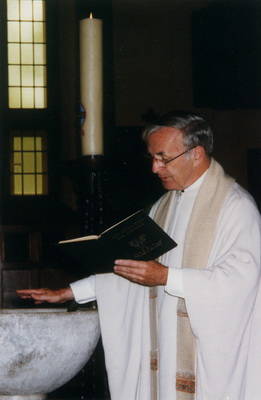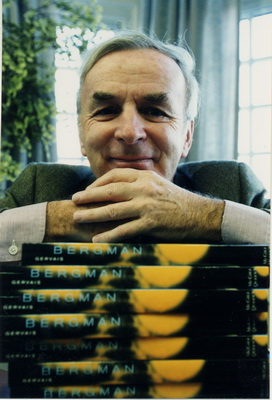 Rev. Marc Gervais was a charismatic Jesuit priest, teacher and movie critic who rattled Vatican authorities in the late 1960s by championing Teorma, a homoerotic film by a Communist film maker Pierre Pasolini which celebrated the healing power of human sexuality. Rev. Gervais taught cinema and communication arts at Concordia University in Montreal for 25 years where he influenced the careers of students such as Clark Johnson, who plays in the HBO television series, The Wire, Oscar winning Quebec film maker, Denys Arcand , producer Kevin Tierney (Good Cop, Bad Cop) and the CBC television journalist Hannah Gartner. Admired as a leading authority on the films of Ingmar Bergman, whom he knew, Gervais died Sunday (march 25) at a retirement home in Pickering, Ont. He was 82 .
Rev. Marc Gervais was a charismatic Jesuit priest, teacher and movie critic who rattled Vatican authorities in the late 1960s by championing Teorma, a homoerotic film by a Communist film maker Pierre Pasolini which celebrated the healing power of human sexuality. Rev. Gervais taught cinema and communication arts at Concordia University in Montreal for 25 years where he influenced the careers of students such as Clark Johnson, who plays in the HBO television series, The Wire, Oscar winning Quebec film maker, Denys Arcand , producer Kevin Tierney (Good Cop, Bad Cop) and the CBC television journalist Hannah Gartner. Admired as a leading authority on the films of Ingmar Bergman, whom he knew, Gervais died Sunday (march 25) at a retirement home in Pickering, Ont. He was 82 .
“His influence was all pervasive, his knowledge of film was prodigious, and his enthusiasm was infectious,” said veteran Montreal film critic John Griffin,” Film to him was more important than petty cant or dogma. He raised at least one generation of important Canadian film makers.”
Gervais often said that his mission was to convert people into becoming responsible movie goers. “That’s not to say the more you know about movies, the more you will enjoy them, but the much more you enjoy some of them, the much less you will enjoy junk,” he once told an interviewer. “Since the 1980s film has really gone downhill. More and more they become rich in technological development, adding sensational effects, sex and violence, but basically an emptiness. The first thing you know, movies like Pulp Fiction became important. There was a time when film tried to capture the human experience, before we went into this sort of post modern detachment.”
 Marc Gervais , the son of a Quebec Superior Court Judge was born in Sherbrooke, Que. Dec. 3, 1929. His maternal grandmother instilled him with his love of cinema. She dragged him along to the movies with her in spite of laws at the time in Quebec which prohibited youngsters from going into cinemas. Gervais entered the Society of Jesus in 1950 after taking an arts degree from Loyola. He was ordained in 1963, but continued his film studies at Catholic University in Washington, D.C., and at the Sorbonne In Paris. While at the Sorbonne he was named head of the Catholic Film Office (OCIC). He set off a storm of controversy within the church when the office awarded its jury prize to Teorma at the 1968 Venice Film Festival. Not only was the film the work of an atheist, but it centres on a mystical figure played by Terrence Stamp, who breathes life into a dysfunctional Italian family by seducing everyone, male and female. Defending his choice, Rev. Gervais wrote that the film was “an inquiry into the human condition. It is a work about the demands of the absolute and about the refusal to be made bourgeois that alienates all men. The fact that the OCIC has given the prize to Pasolini does not mean that 500-million Roman Catholics are obliged to see it.” Rev. Gervais later wrote Pasolini’s biography. In 1979 he obtained his doctorate in film esthetics from the Sorbonne, and in 1981 was appointed a commissioner of the Canadian Radio Television and Telecommunications Commission, a position he held for six years. He was offered a role in Roland Joffe’s 1985 film The Mission, about Jesuit martyrs in 18th century South America. The director wanted to cast real Jesuits in the movie, but Gervais declined and peace activist Daniel Berrigan S.J. took the part instead. Gervais did, however, work as a consultant on Bruce Beresford’s 1991 film Black Robe, about the 18th century Jesuit experience in New France.
Marc Gervais , the son of a Quebec Superior Court Judge was born in Sherbrooke, Que. Dec. 3, 1929. His maternal grandmother instilled him with his love of cinema. She dragged him along to the movies with her in spite of laws at the time in Quebec which prohibited youngsters from going into cinemas. Gervais entered the Society of Jesus in 1950 after taking an arts degree from Loyola. He was ordained in 1963, but continued his film studies at Catholic University in Washington, D.C., and at the Sorbonne In Paris. While at the Sorbonne he was named head of the Catholic Film Office (OCIC). He set off a storm of controversy within the church when the office awarded its jury prize to Teorma at the 1968 Venice Film Festival. Not only was the film the work of an atheist, but it centres on a mystical figure played by Terrence Stamp, who breathes life into a dysfunctional Italian family by seducing everyone, male and female. Defending his choice, Rev. Gervais wrote that the film was “an inquiry into the human condition. It is a work about the demands of the absolute and about the refusal to be made bourgeois that alienates all men. The fact that the OCIC has given the prize to Pasolini does not mean that 500-million Roman Catholics are obliged to see it.” Rev. Gervais later wrote Pasolini’s biography. In 1979 he obtained his doctorate in film esthetics from the Sorbonne, and in 1981 was appointed a commissioner of the Canadian Radio Television and Telecommunications Commission, a position he held for six years. He was offered a role in Roland Joffe’s 1985 film The Mission, about Jesuit martyrs in 18th century South America. The director wanted to cast real Jesuits in the movie, but Gervais declined and peace activist Daniel Berrigan S.J. took the part instead. Gervais did, however, work as a consultant on Bruce Beresford’s 1991 film Black Robe, about the 18th century Jesuit experience in New France.
‘’I was always determined to be a film specialist who happened to be a Jesuit, not a Jesuit who was interested in film,” he once said. In fact, many of his film students were not aware that he was a Roman Catholic priest. He wrote Ingmar Bergman, Magician and Prophet, and among his friends counted other award winning film makers, including John Huston, Norman Jewison, Francois Truffaut, Jean-Luc Goddard and Jean Renoir. He retired from Concordia in 1992, and until he became ill, continued to attend the Cannes Film Festival each year. His judgement of film was often much harsher than his judgement of his fellow human beings. He didn’t preach a sermon, but rather his homilies stressed the importance of an informed conscience.
His own taste in movies was catholic. Among his personal favourites were The Quiet Man, Singing in the Rain and all of Alfred Hitchcock’s films.
He leaves his brother and his sister. The funeral is Friday (March 31) at St. Ignatius of Loyola Church in Montreal.

























Comments
Please login to post comments.